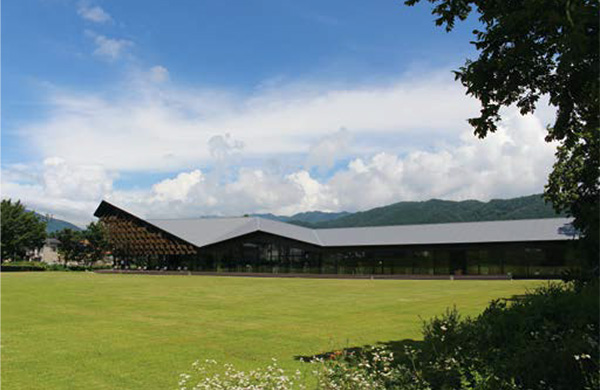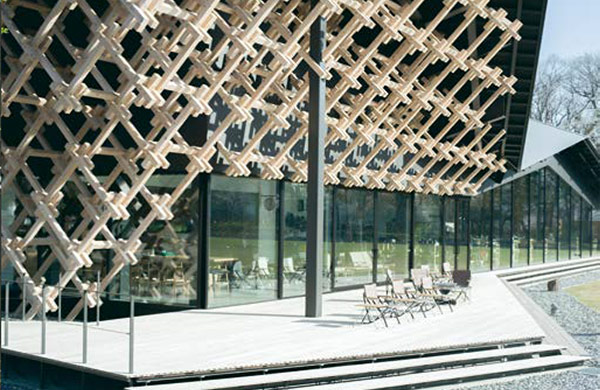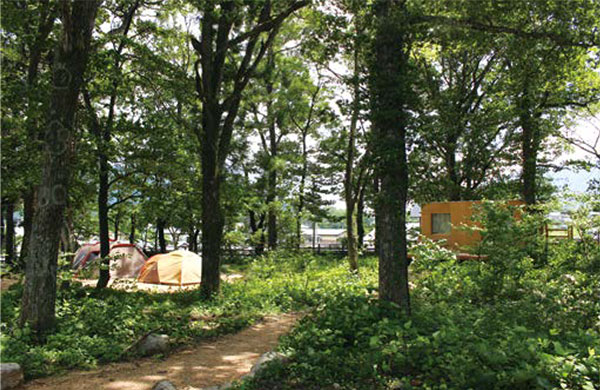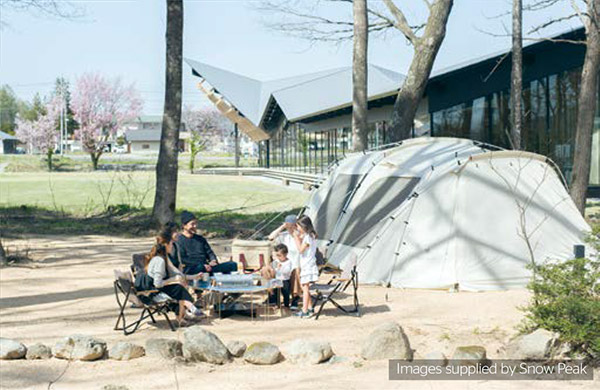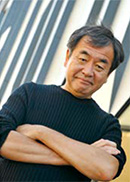News
Does Architecture Make People Happy? —Liberating People from Closed “Boxes”—
Interview with Kengo Kuma
Updated in September 2021
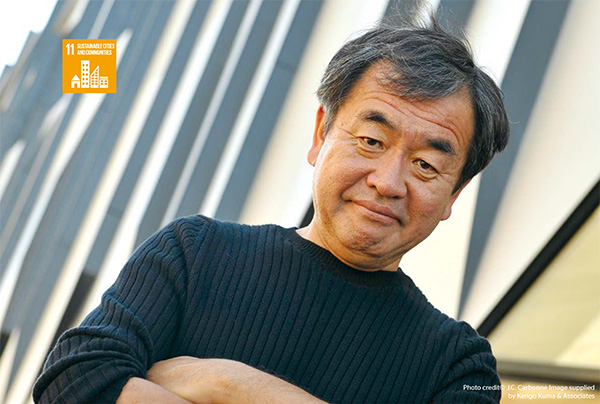
Create large, closed “boxes” by stacking concrete up high, and bring large numbers of people together within those highly airtight boxes. This 20th Century model of architecture (high-rise buildings constructed of glass and concrete) had been generally believed to be the most efficient. However, the spread of the novel coronavirus disease (COVID-19) has revealed the fragilities and weaknesses of the 20th Century model, and has provided an opportunity for us to take note of the shortcomings of contemporary architecture and cities that, until now, we have been accepting as reasonable. As the shape of society that has existed up to now is called into question, how should architecture change going forward? Architect Kengo Kuma continues to propose flexible designs that are people-friendly, while aiming for architecture that is integrated with the environment and culture of its site. We spoke to him about the future of architecture, and about liberating people from closed boxes.
What architecture has brought to people
Humankind is believed to have evolved in Africa around 200,000 years ago and spread around the world. For those of us living in modern times agriculture is something that is taken for granted, but in fact humans only began farming around 10,000 years ago. In historical terms we followed a hunting-and-gathering lifestyle for a long period. Humans’ lifestyles changed suddenly with the advent of farming, because it offered us the option of “settling down” by setting up residence in one location.
Mr. Kuma says the thing that architecture initially delivered to humans was a sense of security. “Human beings are by no means strong creatures physically. That being the case, they were able to obtain a sense of security by building the “boxes” that we know as houses and feeling protected by them. Seeking protection in boxes to achieve peace of mind is a primitive desire.” Following on from this point, Mr. Kuma then has this to say about the relationship between architecture and humans: “These boxes vary depending on the region, culture and climate, but the foundation of contemporary architecture has its roots in the geometric, closed boxes that became established in the Renaissance. In the Middle Ages there were people who believed that confined, cluttered residences were unhygienic and could cause the spread of the plague. As a result of pursuing architecture that was well-organized in terms of geometric order, the Renaissance style of architecture was born.”
Subsequently, as a result of the steady evolution of Renaissance architecture, the so-called “20th Century model” of architecture was born. That model is represented by stacking boxes up high, and then cramming as many people as possible into those large, closed boxes.
“Former UK Prime Minister Winston Churchill said that “We shape our buildings, and afterwards, our buildings shape us,” and as that remark suggests, when architecture is built people become bound by it in some respects. The 20th Century model transformed not only architecture but the lifestyles of the people living in it. A new lifestyle was born in which people worked in boxes in cities and lived in the suburbs, and this became the model for human life as a whole” (Mr. Kuma).
Do not take the environment you are currently in for granted
Up to now we had been convinced that the 20th Century model was indeed the most efficient and outstanding approach to architecture. However, because of the COVID-19 pandemic, this value system is now deeply shaken.
“Until now we had been under the illusion that unnaturally closed spaces with air conditioning were the epitome of efficiency, and we did not attempt to escape this mindset. However, COVID-19 has made us realize the various fragilities and weaknesses of closed boxes. My belief is that when considering architecture, “you should not take your own current environment for granted.” Humans must constantly recreate the environments in which they are living, in response to new circumstances. We need to use COVID-19 as an opportunity to free ourselves from the closed box architecture” (Mr. Kuma).
Architecture in the with/post coronavirus society
The COVID-19 crisis has highlighted the fragilities and weaknesses of the 20 Century model, in which people congregate within closed boxes. This style of architecture will be reviewed in the future, Mr. Kuma says.
“From here on I think it will become important to create “ventilated-style” boxes by blurring the boundaries between inside and outside the boxes, which will improve the comfort of the spaces outside the boxes as well. Up to now urban planning has proceeded based on a top-down approach, but going forward it will be necessary to make bottom-up proposals for linking boxes and cities, by incorporating proposals from communities and regions regarding how they want public spaces such as streets and squares to be used for them.”
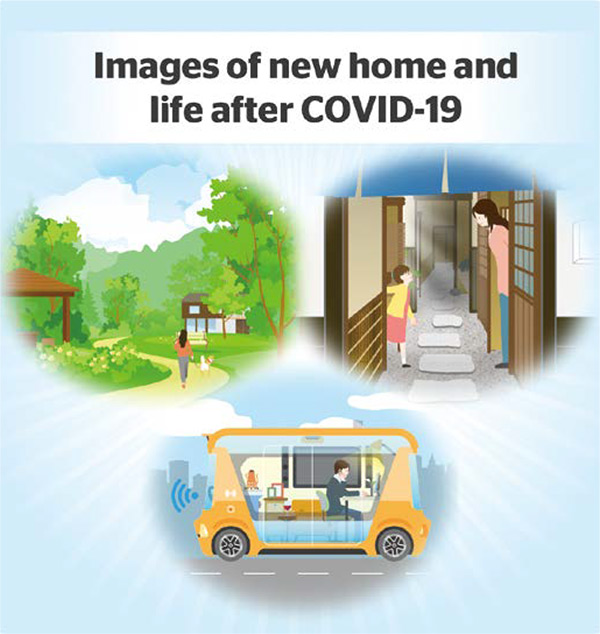
According to Mr. Kuma, the ideal situation is one that liberates people from highly airtight high-rise buildings composed solely of glass and concrete. He says there will be a need for, for example, living environments that are integrated with public spaces, mobility that unifies movement between work and day-to-day life, and the construction of houses that offer good ventilation, such as Kyo-Machiya (traditional Japanese townhouses).
Enhance the quality of public spaces
In pursuing urban planning, the utilization of streets, squares and other public spaces is important, but until now there has not been a great deal of interest in those spaces. Mr. Kuma points out that public spaces need to be perceived as places for people, and consideration needs to be given to mechanisms for ensuring that proper returns can be obtained from enhancing the quality of those spaces.
We must not forget about traffic issues when considering the quality of public spaces. City streets are often very busy, and the air is not very clean either, which is a lot of times not the kind of environment you would want to walk willingly.
“How public spaces can be made walkable is an important challenge. And public transport system such as trains must also change at the same time. Like architecture, up to now trains have been “inhumane” in the sense that they carry a huge number of people who have been crammed into closed boxes. There is a need to reconsider approaches to public transport systems, including “commuting to work,” which could also be described as a time management system. Utilizing self-driving will also be of some help, no doubt. A future challenge will be how to combine public transport and walkability in order to design new public spaces” (Mr. Kuma).
Japanese traditions offer clues for breaking away from closed boxes
What sorts of cities should we aim for in the future in order to break away from closed boxes and enhance public spaces? Mr. Kuma points out that Japan’s traditional frameworks, spaces and arrangements provide clues to address this issue.
“I believe it is possible to discover “systems” within traditional Japanese architecture, as opposed to just shapes as objects. For example, in Kyoto’s traditional townhouses the space between the street and the building is fluidly connected, creating a comfortable environment in which each component complements the other.”
Other clues can also be found in the arrangements that existed in the Edo period, Mr. Kuma goes on to explain.
“In Edo period cities also, there were mechanisms in place to encourage people to venture out of the city. For example, the sankin-kotai policy (which required feudal lords to alternate their place of residence between their domain and the capital of Edo) is in fact a system for living while using two bases. Even feudal lords’ residences comprised not only of their main residences but of secondary and suburban residences as well, and this was a structure that encouraged the dispersal of people by avoiding overconcentration. It seems these practices evolved because experience had taught people that overconcentration could cause significant damage when a fire broke out. Such Edo period systems can provide us with various clues when we consider the urban societies of the future.”
In recent years, there has been a sense of crisis over closed boxes. With that as a backdrop, Japanese models are attracting the world’s attention. Mr. Kuma expresses hope that architecture and science technologies will be merged in the future. He points out that “If Japan’s traditional systems and designs can be blended with technology to revive them in more modern formats, they could well serve as models for the world.”
Making wood fire-resistant and reviving it as a building material will be key
Mr. Kuma points out that up until now, “it was based on an optimistic mindset that the problem of overconcentration could be resolved by steadily stacking up boxes.” The style of architecture based on stacking concrete and glass boxes high to secure the maximum space out of a limited area is certainly a result of focusing on efficiency. However, due to the impact of COVID-19, we have been made aware that the approaches to architecture and space that we have been following up to now are not necessarily correct. How should science and technology be applied to architecture in the future?
“Up until the Edo period Japanese cities had been avoiding the problem of closed boxes because of the refined, wooden architecture that offered good ventilation. Wood is not only light, but has the ability to reduce people’s stress. I call it “a human material.” However, since the 20th Century,architecture that utilizes this human material has gradually been disappearing because it is vulnerable to fire. Nevertheless, recent technological advances in making fire-resistant wood has been attracting attention. Resurrecting wood as a material and looking back on the past will undoubtedly be key to discovering new approaches to cities and architecture” (Mr. Kuma).
This is not limited to fire-resistant wood – many technologies are already in place to construct new cities, Mr. Kuma continues.
“Utilizing carbon fiber, for example, which is lighter and easier to handle than steel, makes it possible to ensure that timber-built architecture possesses the strength to stand up to earthquakes while retaining a light and gentle appearance. A lot of technologies to avoide the problem of closed boxes already exist and are right under our noses. The same applies to mobility-related technologies. By combining new technologies such as self-driving and simulations to avoid congestion with urban planning, it should be possible to produce better environments, I believe.”
“What can humans do?” is an important perspective
When it comes to finding harmony between architecture and nature, up to now the only expectations were for “scenic” outcomes. However, Mr. Kuma says that a more scientific perspective will be needed in the future. Vegetation plays an important role in environmental conservation, including by absorbing carbon dioxide through photosynthesis and working to regulate air temperature. Additionally, planting greenery leads to a cycle in which the soil is made more permeable and so rain is properly absorbed by the soil. This also has the effect of preventing flooding by preventing soil surface erosion.Nevertheless, scientific knowledge like this is yet to be fully exploited in architecture, Mr. Kuma says.
Given these current circumstances, Mr. Kuma expresses a sense of crisis: “New technologies and knowledge generated by science need to be rapidly integrated into urban planning and architecture.”
“In recent years when floods and other disasters are reported, in many cases they are thrown out with the single phrase “abnormal weather.” It seems to me, there’s an important perspective missing; “What can humans do?” It is a very sad thing. I would expect that if urban design is carried out based on scientific simulations and research, it will also make it possible to mitigate such disasters” (Mr. Kuma).
With regard to environmental problems also, many research reports suggest that using wood can reduce greenhouse gas emissions, but currently those research outcomes are not reflected in actual policies or legislation, Mr. Kuma points out.
“Collaborations between scientists, policy-makers and designers will undoubtedly become increasingly important in the future” (Mr. Kuma).
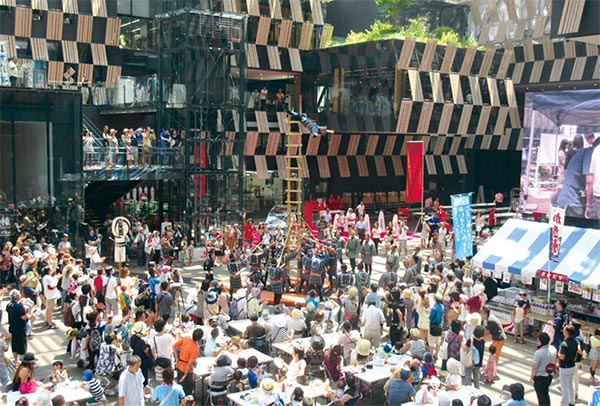
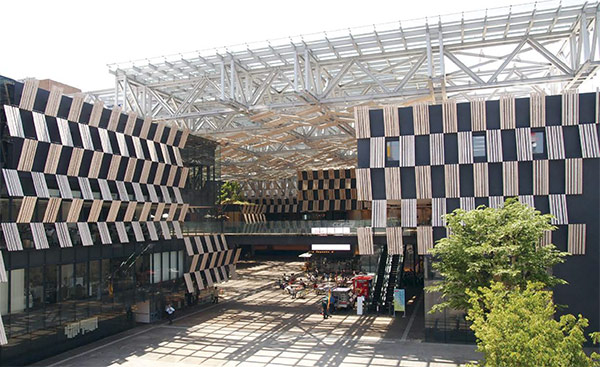
Source: supplied by Nagaoka City Hall
What is architecture that generates a feeling of well-being?
The use of remote working and online studies has become widespread, accelerated by the COVID-19 pandemic. The pandemic has brought a variety of problem areas that are inherent to contemporary housing to the fore, and as such, it is serving as an opportunity to reconsider approaches to housing, architecture and even cities. In closing, we asked Mr. Kuma what types of architecture can imbue us with a sense of well-being.
“Until COVID-19 surfaced, I think in a large number of cases people working in boxes in cities lived in places where they could commute to work, and so their homes were little more than places where they slept─not workplaces. As a result, when they now find themselves trying to work remotely problems are surfacing, including being unable to concentrate on work because they are unable to simply switch off from their families’ conversations. In Japan, in the past, regional communities existed and a “shift system” was also in place, which meant children could be entrusted to someone to look after. The representative example is the extended family system that was adopted by farming families. It worries me that the dwellings and ways of living that have become commonplace in modern times, such as the denuclearization of families in the suburbs, may not be adaptable to the changes currently taking place.”
Mr. Kuma goes on to discuss the outlook for realizing inclusive societies:
“If considered in terms of our inherent physiology as living things, human beings have been living highly unnatural lifestyles up to now. One outcome of compulsively stacking up boxes has been the appearance of various convenient machines such as elevators. On the other hand, my feeling is that this has resulted in living environments that are not at all conducive to people with disabilities or senior citizens, for example.”
This is also the starting point for the difficult-to-live environments that we all face. If you consider the notable characteristics of “human beings” as living things, their bodies are in no way robust. So it is necessary to create natural, horizontal environments, Mr. Kuma says.
“Unless we begin seriously considering designs and technologies with that in mind, we will likely be unable to respond when another powerful virus emerges. If you look at the history of humankind, it is our history as hunters and gatherers that is much longer. Humans’ current style of habitation, which involves settling down in closed boxes, is not in our intrinsic nature as living things. Using the COVID-19 pandemic as an opportunity to take another look at our approaches to cities and architecture should surely lead us to think about what constitutes truly happy lifestyles and existences” (Mr. Kuma).
Examples of the technologies, spaces, architecture and other components that are needed for constructing new cities
-
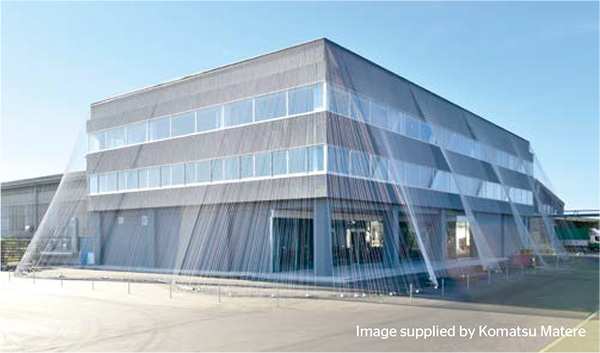
“fa-bo,” a fabric laboratory (the former head office building of Komatsu Matere Co., Ltd.) that arose out of a collaboration involving Komatsu Matere and others, and which was planned and designed by Mr. Kuma -
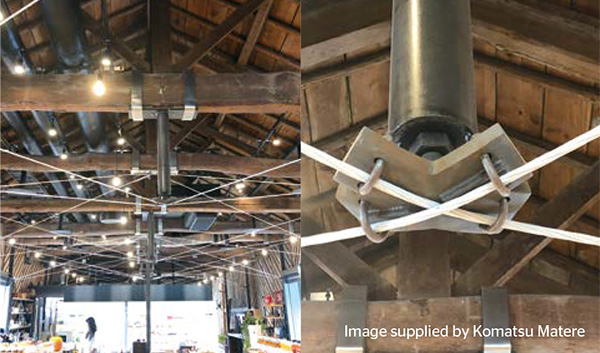
These images show the Tomioka Warehouse No.3 warehouse following seismic reinforcing carried out based on Mr. Kuma’s renovation design. The existing roof trusses and existing walls were utilized as much as possible, in order to preserve the building’s aesthetics. Images supplied by Komatsu Matere. -
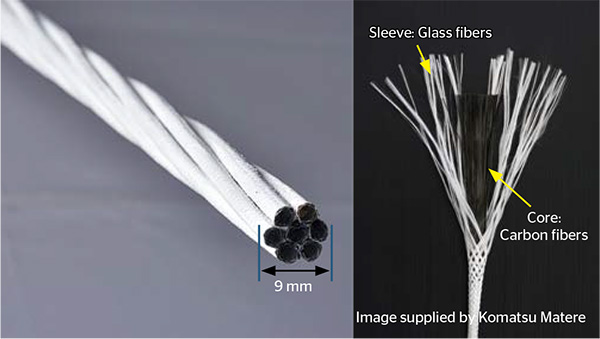
The project to renovate the former head office of Komatsu Matere was the first project in the world to utilize CABKOMA Strand Rod (a flexible rod-shaped carbon fiber composite) as the seismic reinforcing material. With CABKOMA Strand Rod a bundle of carbon fibers forms the core, and the outer layer of this core is then covered with braids of synthetic fiber. Adding loose strands to the carbon fiber core gives rise to a material that is flexible and easy to handle. It is being applied to the seismic reinforcing of timber-built architecture in particular, and is even being used in seismic upgrades of historical buildings such as temples. -
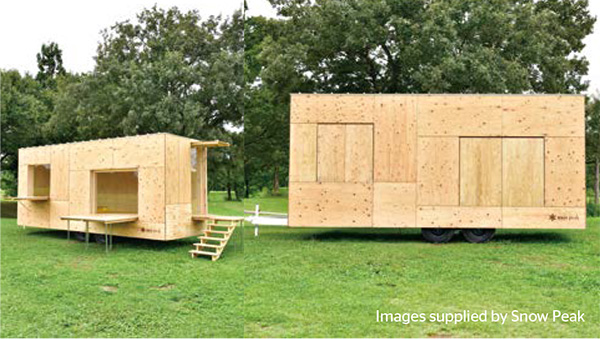
Snow Peak Land Station Hakuba, Snow Peak Inc.’s interactive-type complex in Hakuba Village, Nagano Prefecture, was designed by Mr. Kuma. Mr. Kuma has created a large number of architectural works that focus on fire-resistant timber. In the outdoor excursion area (below left) it is also possible to learn about disaster prevention and disaster reduction. Will there be more environments where it is possible to naturally absorb knowledge like this in the future?
The “Jyubako” (lit. “living box”), which was jointly developed by Mr. Kuma and Snow Peak. The Jyubako allows people to travel and live freely. This mobile house (trailer house) is movable, made of wood and can be towed by a car. It can serve as a dwelling, as a workspace or even as an accommodation facility. The resurrection of well-ventilated wooden architecture, combined with mobility that makes it possible to move anywhere, may well emerge as a new approach to architecture and space.
Contributed and translated by JST Science Portal.









